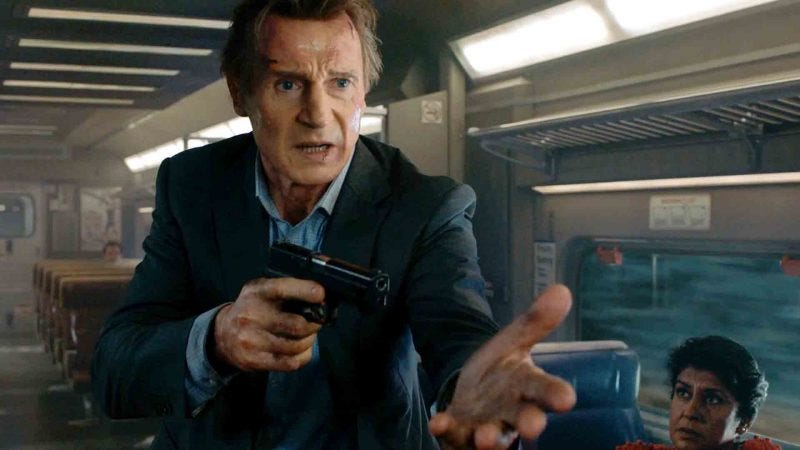The Commuter

The Commuter marks maybe (hopefully) the last of this decade's plague of Liam Neeson-led action films. 2008’s Taken transformed Neeson from a reputable dramatic performer into a surprisingly convincing action star, with the words, “I will find you, and I will kill you.” One other film after that, The Grey in 2011, would make a decent case for this shift in Neeson’s shift in style. Unfortunately, that makes only two of the nine-plus action films he's starred in during the last ten years. The rest have been generic, poorly written ripoffs of other action films, sometimes even Neeson’s own.
This most recent attempt, is no exception, following the beats of Neeson’s already lame Non-Stop from 2014. Both feature an aging man riding a form of mass transportation, tasked with finding and taking down an individual who “doesn't belong.” Both aging men are either current or former law enforcement. Both aging men manage to survive absurdly dangerous situations that might kill even the most well-trained. And most notable of all, both aging men are played with about as much heart and nuance as you'd expect from an actor who said in September, “Guy's I'm sixty-fucking-five. Audiences are eventually going to go: 'Come on.’”
And as it turned out, that seemed to be the prevailing sentiment I felt watching The Commuter: “Come on.” Neeson’s character, Michael McCauley is a sixty-something insurance salesman. He was once an NYPD officer, but that part of his life has long since ended. He has a wife and a kid about to go to college, and he's just trying to make a living and be able to pay off his son's anticipated loans. The message this movie tries to send in its opening minutes is, “He's just an ordinary guy.”
Of course, once Michael has been roped into a convoluted conspiracy that threatens everything he loves, the movie does everything it can to make you forget that. The list of absurd feats “ordinary guy” Michael pulls off includes fighting and beating a young federal agent, taking a number of blunt objects to the face (including an electric guitar), and jumping from one train car to another, which doesn't sound too ridiculous, until you realize that the train car he's jumping from has derailed and is soaring through the air at over 80 miles an hour. Now, my suspension of disbelief can withstand a heavy beating. But when the main message of your opening sequence is, “HE'S JUST A NORMAL OLD MAN,” and then he does things on par with Taken protagonist Bryan Mills, there's just no way you can justify it.
But it's not just Michael's ludicrous accomplishments that make The Commuter so hard to buy into. As referenced earlier, Neeson clearly doesn't care anymore. Perhaps he's signed some contract where he's had to do a certain number of generic action thrillers, or maybe he just likes that he can phone it in for a decent paycheck. Whatever it is, the man just isn't into it. There are moments where he looks like he might be trying to play the role with some conviction, but I get the feeling that he's played the same character, repurposed for different movies so many times in the last decade that he's struggling to feel attached. It's not just Neeson either. Vera Farmiga and Patrick Wilson are also well-respected stars, but you probably wouldn't guess it if this is your first time seeing them. Admittedly, Wilson does the best with what he's dealt, giving not a good performance, but at least a believable one.
Though really, it's hard to blame the actors when they're operating under the leadership of a less-than-competent, clearly un-impassioned director in Jaume Collet-Serra. The lack of any sort of style—or substance, for that matter—leaves The Commuter feeling unbearably plain. The grey, overly polished aesthetic makes every shot feel all the more artificial and bland. During close-ups, I couldn't tell if actors’ faces were digitally touched-up, or if the lighting and color grading was just that factory-perfect. Whatever the problem, visual artistry was obviously not on Collet-Serra’s mind.
The cinematography ranges from uninteresting to unfortunate. During calmer scenes, it's the former. But when the action kicks up, it's almost hard to tell what's going on. It isn't exactly the genre-standard “shaky cam,” but rather a strange, digital bastardization of the long one-shot. Rather than fast cuts and extremely tight shots, Collet-Serra opts to have the camera float in and around the fights, orbiting like a drone as the characters brawl, pushing in to let Neeson step out of frame so his stunt double can come in, and pulling out when everyone's in place for the “big hit” of the fight. It's an incredibly bizarre way to shoot a scene, and it's hard to tell how much of it was done in-camera, and how much as merged with CGI in post-production. I guess that was Collet-Serra’s idea of making the fights visually interesting—since the choreography was hilariously tame—but it ended up making them more all the more confusing.
Really, there isn't much to gain from watching The Commuter. It's not the worst movie you'll see this year, I'm sure, and I wouldn't call it “terrible,” but it fits in with the typical expectation for January's cinema fare: bland, unoriginal, and half-assed. I will say that The Commuter’s main source of enjoyment, as it were, comes from the schlock value; that is, the film's general embracing of its own stupidity. It's fun to laugh at. I guess.


